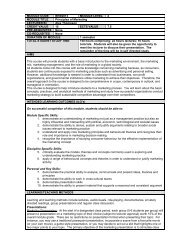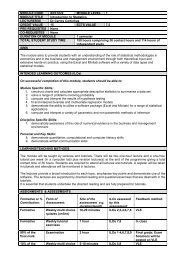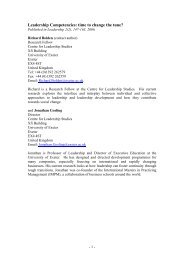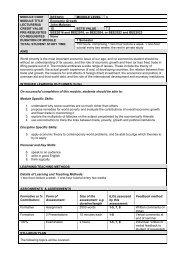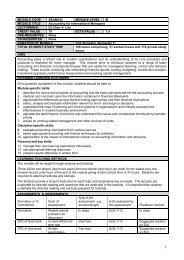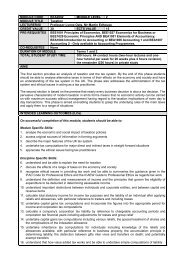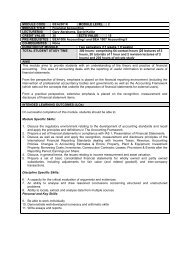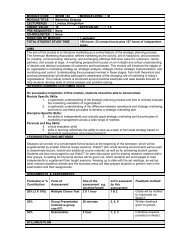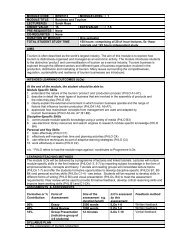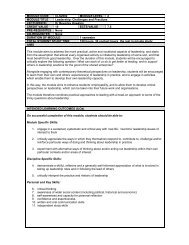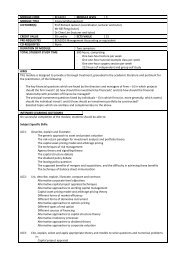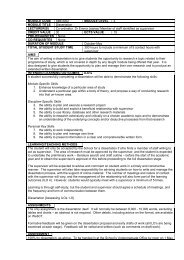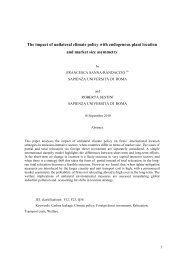What is Leadership? - The Business School - University of Exeter
What is Leadership? - The Business School - University of Exeter
What is Leadership? - The Business School - University of Exeter
Create successful ePaper yourself
Turn your PDF publications into a flip-book with our unique Google optimized e-Paper software.
Defining <strong>Leadership</strong><br />
<strong>The</strong> topic <strong>of</strong> leadership has been <strong>of</strong><br />
interest for many hundreds <strong>of</strong> years,<br />
from the early Greek philosophers such<br />
as Plato and Socrates to the plethora <strong>of</strong><br />
management and leadership gurus,<br />
whose books fill airport bookshops.<br />
Seldom, however, has the need for<br />
effective leadership been voiced more<br />
strongly than now. It <strong>is</strong> argued that in<br />
th<strong>is</strong> changing, global environment,<br />
leadership holds the answer not only to<br />
the success <strong>of</strong> individuals and<br />
organ<strong>is</strong>ations, but also to sectors,<br />
regions and nations.<br />
"Our productivity as a nation <strong>is</strong><br />
already lagging behind our<br />
competitors in North America and<br />
Europe. By tackling our management<br />
and leadership deficit with real vigour,<br />
we will unlock the doors to increased<br />
productivity, maxim<strong>is</strong>e the benefits <strong>of</strong><br />
innovation, gain advantage from<br />
technological change and create the<br />
conditions for a radical transformation<br />
<strong>of</strong> public services.” (DfES, 2002)<br />
Despite recognition <strong>of</strong> the importance <strong>of</strong><br />
leadership, however, there remains a<br />
certain mystery as to what leadership<br />
actually <strong>is</strong> or how to define it. In a<br />
review <strong>of</strong> leadership research, Stogdill<br />
(1974, p.259) concluded that there are<br />
“almost as many definitions <strong>of</strong> leadership<br />
as there are persons who have<br />
attempted to define the concept” - and<br />
that was 30 years ago!<br />
At the heart <strong>of</strong> the problem <strong>of</strong> defining<br />
leadership lie two fundamental<br />
difficulties. Firstly, like notions such as<br />
‘love’, ‘freedom’ and ‘happiness’,<br />
leadership <strong>is</strong> a complex construct open<br />
to subjective interpretation. Everyone<br />
has their own intuitive understanding <strong>of</strong><br />
what leadership <strong>is</strong>, based on a mixture <strong>of</strong><br />
experience and learning, which <strong>is</strong> difficult<br />
to capture in a succinct definition.<br />
Secondly, the way in which leadership <strong>is</strong><br />
defined and understood <strong>is</strong> strongly<br />
influenced by one’s theoretical stance.<br />
<strong>The</strong>re are those who view leadership as<br />
the consequence <strong>of</strong> a set <strong>of</strong> traits or<br />
character<strong>is</strong>tics possessed by ‘leaders’,<br />
whilst others view leadership as a social<br />
process that emerges from group<br />
relationships. Such divergent views will<br />
always result in a difference <strong>of</strong> opinion<br />
about the nature <strong>of</strong> leadership.<br />
“<strong>Leadership</strong> appears to be, like power,<br />
an ‘essentially contested concept’”<br />
(Gallie, 1955 cited in Grint, 2004, p1)<br />
Grint (2004) identifies four problems<br />
that make consensus on a common<br />
definition <strong>of</strong> leadership highly unlikely.<br />
Firstly, there <strong>is</strong> the ‘process’ problem – a<br />
lack <strong>of</strong> agreement on whether leadership<br />
<strong>is</strong> derived from the personal qualities<br />
(i.e. traits) <strong>of</strong> the leader, or whether a<br />
leader induces followership through what<br />
s/he does (i.e. a social process).<br />
Secondly, there <strong>is</strong> the ‘position’ problem<br />
– <strong>is</strong> the leader in charge (i.e. with<br />
formally allocated authority) or in front<br />
(i.e. with informal influence)? A third<br />
problem <strong>is</strong> one <strong>of</strong> ‘philosophy’ – does the<br />
leader exert an intentional, causal<br />
influence on the behaviour <strong>of</strong> followers<br />
or are their apparent actions determined<br />
by context and situation or even<br />
attributed retrospectively? A fourth<br />
difficulty <strong>is</strong> one <strong>of</strong> ‘purity’ – <strong>is</strong> leadership<br />
embodied in individuals or groups and <strong>is</strong><br />
it a purely human phenomenon?<br />
In addition to these relatively theoretical<br />
contentions Grint also d<strong>is</strong>tingu<strong>is</strong>hes<br />
between attitudes towards coercion.<br />
Some definitions <strong>of</strong> leadership restrict it<br />
to purely non-coercive influence towards<br />
shared (and socially acceptable)<br />
objectives. Within such frameworks the<br />
likes <strong>of</strong> Hitler, Stalin and Saddam<br />
Hussein would not be seen as leaders,<br />
but rather as tyrants working solely for<br />
their own benefit and depending on<br />
threat, violence and intimidation rather<br />
than the more subtle processes <strong>of</strong><br />
interpersonal influence more frequently<br />
associated with ‘true’ leadership. Such<br />
d<strong>is</strong>tinctions, however, are always<br />
problematic as the actions <strong>of</strong> nearly all<br />
leaders could be perceived more or less<br />
beneficially by certain individuals and<br />
groups.<br />
“Scholars should remind us that<br />
leadership <strong>is</strong> not a moral concept.<br />
Leaders are like the rest <strong>of</strong> us:<br />
trustworthy and deceitful, cowardly<br />
and brave, greedy and generous. To<br />
assume that all leaders are good<br />
people <strong>is</strong> to be wilfully blind to the<br />
reality <strong>of</strong> the human condition, and it<br />
severely limits our scope for becoming<br />
more effective at leadership.”<br />
(Kellerman, 2004, p45)<br />
www.leadershipsouthwest.com 4



